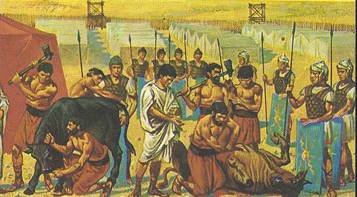Today we speak the words, “I am a World citizen,” with pride. To the people of the ancient world the statement, “I am a Roman citizen,” was a badge of high honour. Beginning as a small city state in Italy, Rome grew into a vigorous republic and finally into an empire so mighty that it included the whole of the Mediterranean world. Even after Rome’s grandeur had waned, its influence lived on among later peoples. Rome’s history is a reminder that the destiny of a nation rests more on the wisdom of its leaders and the character of its people …
Read More »Tag Archives: Augustus
The End of the City A. D. 192 – A. D. 476
ON ROME’S first day, Romulus took a bronze plow and drew a magic circle around seven of the hills that stood beside the River Tiber. The magic of the circle was protection against the evils outside. More important, it bound together the people who were inside, making one city where there had been six towns. Seven hundred years later, Augustus drew another magic circle, this time around all the Mediterranean world. It kept out barbarian and Asian invaders and held together millions of people, making one empire where there had been dozens of races and nations. So long as the …
Read More »The Emperor’s City A. D. 14 to A. D. 117
GREAT power had allowed Augustus to do great good for Rome and its provinces. The same power in the hands of a man who was not good meant that he could do great harm. This the Romans learned as they watched the remarkable parade of good and evil men who came to govern Rome after Augustus. Some of them were wise, two or three were foolish, one thought he was the greatest artist in the world and another said he was a god. All were the masters of Rome, mighty princes who were called emperors. The title emperor came from …
Read More »The City of Augustus 29 B. C. – A. D. 14
IN 29 B.C. the gates of war were closed. Rome was at peace. Senators and the people of the mob-men who had hated and fought each other through long, bitter years — stood side by side in the Forum while the great doors of the temple of Janus were slowly pushed shut. That had happened only twice before in the history of the city. The crowd in the Forum cheered the peace and they cheered Octavius, their new ruler. He was no longer the young man who had rushed to Rome after the murder of his uncle, Caesar. Seventeen years …
Read More »


